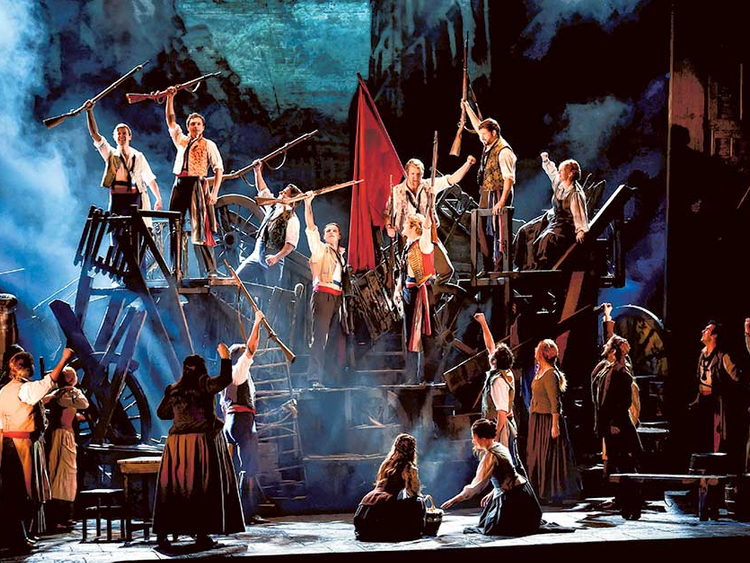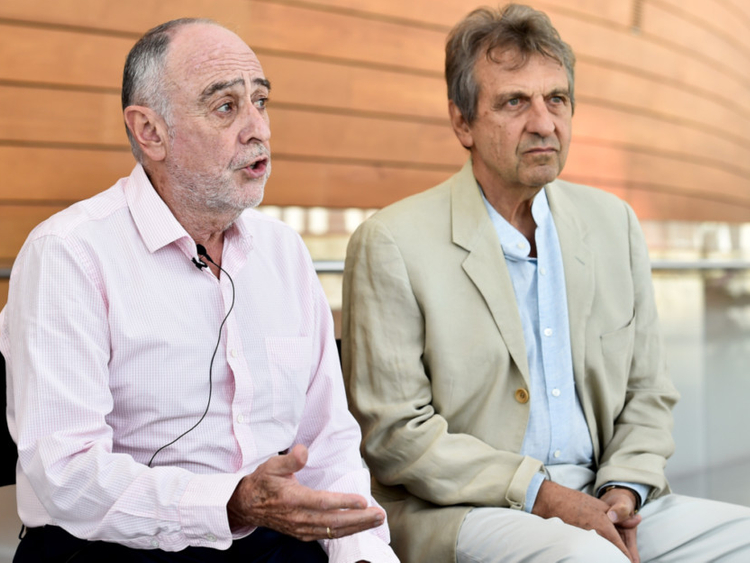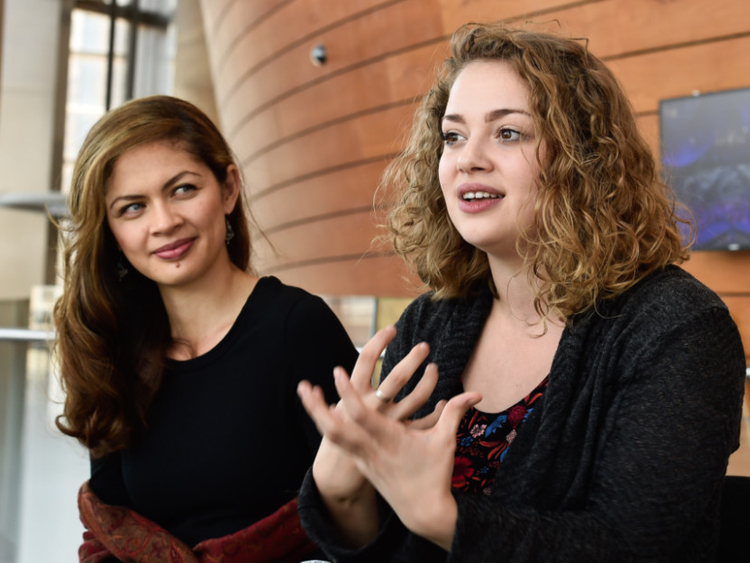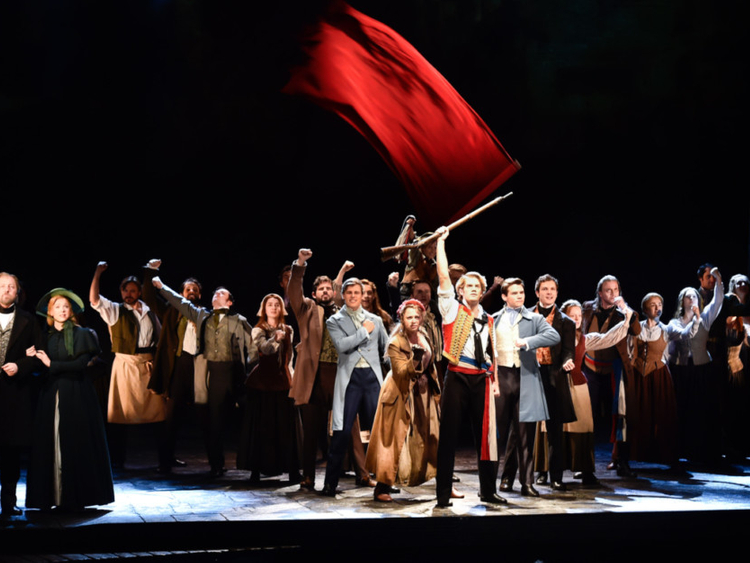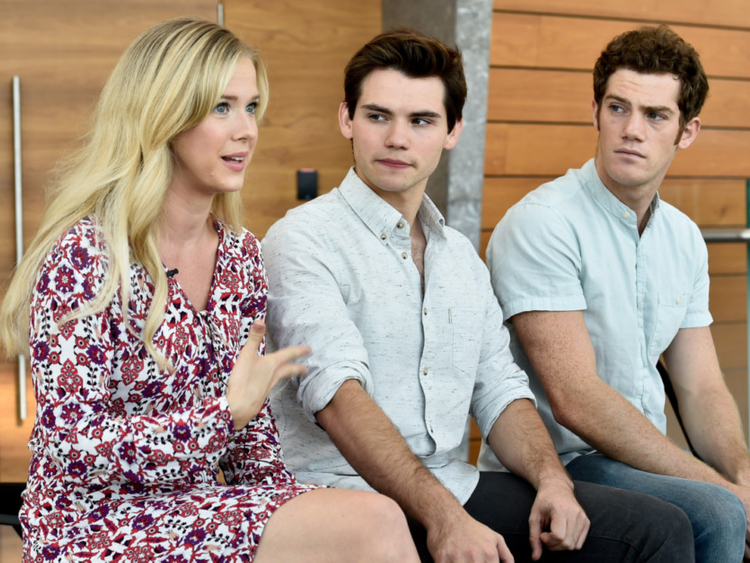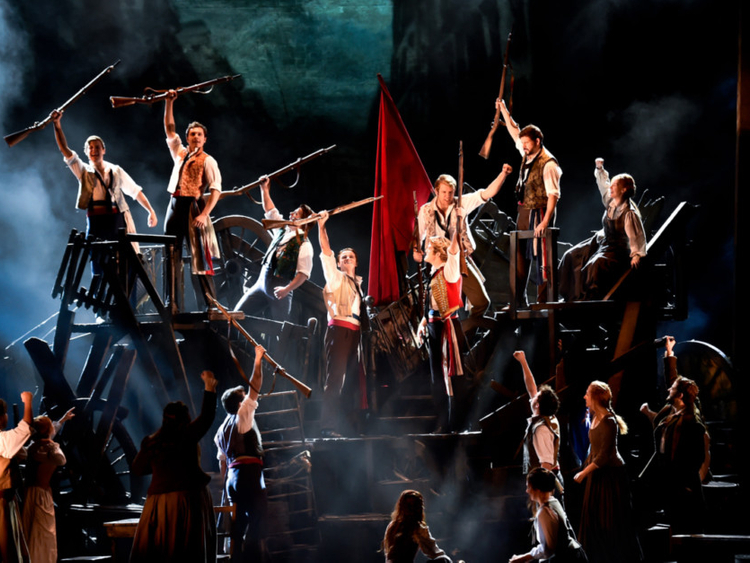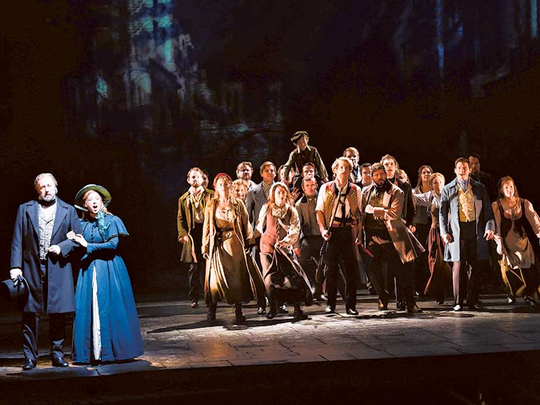
Dirty politics, murky morality and a disenfranchised society crushed by authoritarianism. It’s been two centuries since Les Miserables tackled these themes. When will we stop being able to relate?
I came out of the Dubai Opera auditorium on Monday after a 15-minute preview of the West End’s longest-running musical, showing in Dubai until December 2, and people were weeping. That’s all it took. Four songs extracted from a three-hour production and the audience were hooked.
Claude-Michel Schonberg and French lyricist Alain Boublil are to thank. The French and Tunisian duo, joined by English-language lyricist Herbert Kretzmer, wrote the iconic songs (I Dreamed a Dream, Do You Hear the People Sing?, etc.) 30 years ago, based on the historical text penned by Victor Hugo in the 1800s.
“Most of the problems which are exposed in this musical have not been solved. They have not even started to be resolved,” Boublil, 75, told Gulf News tabloid! in Dubai. “In some parts of the world, it’s even going worse than what the music was describing, which was France of the 19th century, which was not a very nice place to live in unless you were among the elite of the country.”
Les Miserables — the first musical to come to Dubai Opera, which opened less than three months ago — follows Jean Valjean, a French peasant who spends nineteen years jailed for stealing a loaf of bread for his starving niece. He breaks out and attempts to start his life over, only to be mercilessly tracked by totalitarian police inspector Javert.
A revolution is meanwhile happening in France, and a cast of characters struggle to survive it.
Producer Cameron Mackintosh (Cats, Miss Saigon, Mary Poppins, Phantom of the Opera) assembled a ‘dream team’ of actors from Broadway, the West End and Australia for Dubai. Patrice Tipoki is Fantine, Peter Polycarpou is Thenardier, Jodie Prenger is Madame Thenardier, Carrie Hope Fletcher is Eponine, Alistair Brammer is Enjolras, Emily Langridge is Cosette and Paul Wilkins is Marius. In the lead, John Owen-Jones is Jean Valjean and Hayden Tee is Javert.
According to Mackintosh, Les Miserables is as successful in the classroom, staged by pupils, as it is on stage at Dubai Opera, because “everyone recognises these characters — Eponine, Thenardier, Jean Valjean. Every generation in every nation in the world has the same kind of characters.”
In Act 2, students build a barricade as a rally point. They go head-to-head with the monarchy and start a revolution.
“How many times do I pick up a local newspaper anywhere in the world, and think, ‘Oh my god, how did they get a picture of Les Mis on the front page?’ It’s a riot in Paris. It’s a riot in Syria. It’s a riot in Istanbul. It’s entirely contemporary,” Mackintosh said.
The same is true of his production Miss Saigon, written 30 years ago and set during the Vietnam War.
“Look at the end of Act 1 of Miss Saigon when the Vietnamese were crossing China’s seas as refugees — who would’ve thought 30 years on, we would be seeing far greater numbers crossing the Mediterranean?”
Tipoki remembered performing Les Miserables in Brisbane on the day of the Paris attacks, a year ago this month. They held a moment of silence during their bows.
“It was just so emotional for us to think that the themes that we portray are still so relevant all around the world, no matter where you are,” she said.
‘METALICCA, SLAYER, IRON MAIDEN’
Back in Dubai, Schonberg and Boublil echoed Mackintosh’s sentiments about the dream team cast. They called Owen-Jones the best Valjean in the world right now.
“That’s made my day, that,” responded Owen-Jones. “I get on very well with them ... When we come to the theatre, they get on the bus with the cast — they don’t have cars or anything. I know Claude-Michel Schonberg has a bus pass. He travels on the tube. They’re very normal, down-to-earth guys.”
Owen-Jones is a theatre celebrity himself. He’s been in Les Mis since 1995 and has played Valjean, on and off, for 20 years.
“It’s something that actors come back to because it’s a family. It’s an ensemble piece,” he said.
When he first started, he was unmarried. Now that he has kids, he’s able to bring a newfound roundedness and maturity into the role.
“I’ve done this so much now that I can literally just put on the costume and I’m there. But to get my emotions going ready from the beginning, I listen to heavy metal when I’m getting my make-up on. Metallica, Slayer, Iron Maiden, really extreme stuff. I’ve always been a fan of that kind of music, it helps me adrenalise,” he said.
His onstage nemesis, however, saves the noise for the stage. The comedic Tee, who plays the antagonist Javert, doesn’t see his character as a villain, despite what certain crowds in Australia may think.
“I get booed in Perth. It’s a big city, but maybe not as cosmopolitan as Sydney or Melbourne. I get booed and I’m like, ‘This is not a panto! What do you think you’re watching?’” joked Javert.
25 YEARS STRONG
In 2009, Les Miserables celebrated 25 years on the stage. More colour was injected into the costumes, sets and staging. But Schonberg, 72, was severe in his assertion that the score has never changed.
“Our part, we did it thirty years ago, and the show is what it is. The curators and producers have to take the score the way it’s written,” he said.
“We are very protective. Even for the lyrics, when we have to go to Japan or Czech Slovakia or Finland, and they have a translation, we don’t change one note for the score.”
To date, there have been more than 20 translations of the musical in 43 countries. Boublil has personally supervised each one.
“And I keep doing that. Last week, there was a translation in Korea. In Spain, you have two different translations — because for Barcelona, you have one Spanish, and when you play Madrid, it’s not the same language. And in Argentina it’s another Spanish,” he said.
CHANGING OUR LIVES
Last summer, Boublil and Schonberg were in Delphine, Greece, together. They met a man who bestowed a bit of wisdom on them: 2,000 years ago, he said, big Greek dramas were only allowed on stage if they were helping the audiences to solve their own problems.
“This show has been changing our lives. It has been changing a lot of people’s lives,” said Schonberg.
“It’s a little part of you on stage. It’s a little bit of your own story. You can be Arabic. You can be Japanese. You can be from Argentina. It’s your story, a little bit, because we hope that the show helps you to solve your own problems.”
Boublil suggested they’ve succeeded in that task, as evidenced by the letters they receive.
“You’ve changed our world,” one read.
“I decided not to divorce because of seeing this show,” another admitted.
“We don’t understand why, very often,” said Boublil. But what matters most, perhaps, is that not all hope is lost.
Don’t miss it
Les Miserables runs until December 2 at the Dubai Opera. To book tickets (Dh275-Dh1,475) go to dubaiopera.com.



